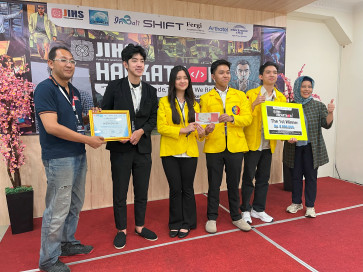Precious one connecting two worlds through handicrafts
Cute touch: Precious One workshop also sells Minimi, personalized paper dolls made of colored paper
Change text size
Gift Premium Articles
to Anyone
 Cute touch: Precious One workshop also sells Minimi, personalized paper dolls made of colored paper.(Courtesy of Precious One)" border="0" height="348" width="512">Cute touch: Precious One workshop also sells Minimi, personalized paper dolls made of colored paper.(Courtesy of Precious One)
Cute touch: Precious One workshop also sells Minimi, personalized paper dolls made of colored paper.(Courtesy of Precious One)" border="0" height="348" width="512">Cute touch: Precious One workshop also sells Minimi, personalized paper dolls made of colored paper.(Courtesy of Precious One)By employing 18 people with hearing impairments, a handicraft workshop is providing not only financial security for its employees, who mostly come from low-income backgrounds, but most importantly a bridge between the hearing-impaired and the rest of society.
The workshop of the Precious One handicraft foundation in Kembangan, West Jakarta, starts to come alive as early as 8 a.m. when employees arrive one by one and greet each other with sign language.
Soon, the workshop, also known as P-One and located in the upmarket Permata Buana housing complex, is filled with the sound of sewing machines, scissors and cloth-cutting tools. Most of the employeesâ hands are full with pieces of cloth or accessories.
January was a busy month as they were trying to complete orders from the Parkson and Centro department stores, which ordered 7,000 linen ang pao money pouches to welcome the upcoming Chinese New Year, or imlek, which falls on Feb. 8.
Ratnawati Sutedjo, the workshopâs founder, said they offered three kinds of linen products for the Year of the Fire Monkey â from chunky monkey-design hand-carry bags to slim monkey-themed sling bags for children, as well as ang pao pouches.
âThe monkey bags can be used to present family gift hampers or cookies. Children can also carry them to collect their ang pao,â she told The Jakarta Post in the workshop.
 Ratnawati Sutedjo (JP/Indah Setiawati)
Ratnawati Sutedjo (JP/Indah Setiawati)
Ratna said they were accustomed to receiving bulk orders and tried to meet deadlines to satisfy their customers.
Once, they received an order of 10,000 tissue holders and managed to send 2,000 pieces every month. They could also finish an order of 4,600 koala pouches in three weeks.
Precious One, which now employs 18 people with hearing impairments, has been around for 11 years, producing various fabric handicraft products, from bed and kitchen linen to school visual aids, such as fruit-shaped soft toys as well as mini personalized paper dolls. The products share similar characteristics: they highlight cuteness and neatness.
Meeting retail and wholesale orders for local and international markets, including Malaysia and Australia, the workshop displays its products on its website and social media.
Evi, one of the employees responsible for visualizing Ratnaâs product designs into sewing patterns, said she loved her job and was proud to know that her products could reach a wide range of customers.
âOne day, I saw a little kid wearing our sling bag and an old lady carrying our hand bag in Artha Gading shopping mall [in North Jakarta]. I was very happy to realize that those products were produced in my workplace,â she said as translated by Ratna.
 Time of the season: Ang pao money pouches are specially designed for Chinese New Year.(JP/Indah Setiawati)
Time of the season: Ang pao money pouches are specially designed for Chinese New Year.(JP/Indah Setiawati)
Her face beamed with self-confidence as she described how she could make various products. When Ratna asked her to make a mini paper doll, her fingers moved swiftly and skillfully as she rolled long and very tiny colorful paper to shape a body, a head and a pair of shoes. The miniature paper doll was ready in just about 15 minutes.
Evi was the first employee of Precious One. She was introduced by her sibling to Ratna over a decade ago when the latter was looking for a friend with a hearing impairment.
At that time, Ratna had a commitment to help the deaf community after she recovered from an illness that forced her to have a long bed rest. She learned sign language and told everybody in her community that she was looking for a deaf friend.
âI went to Eviâs house to assure her parents that I had good intentions. I understood that parents of people with hearing disabilities are often overprotective because, back then, their children were often mocked,â she said.
A talented handcrafter, Ratna taught Evi to make hairpins and greetings cards manually, which saw good sales among her friends. When Evi asked her permission to bring her deaf friend to work with them, Ratna began to take a more serious approach by developing the product range.
âIn around two years, people started to get to know our products. They came to our workshop to look for presents for their loved ones. We also started to buy sewing machines,â she said.
By the fifth year, the number of employees had increased and the shop that was under the Karya Insan Sejahtera Foundation achieved sustainability in its business.
 Cute touch: <)
Cute touch: <)
Cute touch: Precious One workshop also sells Minimi, personalized paper dolls made of colored paper.(Courtesy of Precious One)
By employing 18 people with hearing impairments, a handicraft workshop is providing not only financial security for its employees, who mostly come from low-income backgrounds, but most importantly a bridge between the hearing-impaired and the rest of society.
The workshop of the Precious One handicraft foundation in Kembangan, West Jakarta, starts to come alive as early as 8 a.m. when employees arrive one by one and greet each other with sign language.
Soon, the workshop, also known as P-One and located in the upmarket Permata Buana housing complex, is filled with the sound of sewing machines, scissors and cloth-cutting tools. Most of the employees' hands are full with pieces of cloth or accessories.
January was a busy month as they were trying to complete orders from the Parkson and Centro department stores, which ordered 7,000 linen ang pao money pouches to welcome the upcoming Chinese New Year, or imlek, which falls on Feb. 8.
Ratnawati Sutedjo, the workshop's founder, said they offered three kinds of linen products for the Year of the Fire Monkey ' from chunky monkey-design hand-carry bags to slim monkey-themed sling bags for children, as well as ang pao pouches.
'The monkey bags can be used to present family gift hampers or cookies. Children can also carry them to collect their ang pao,' she told The Jakarta Post in the workshop.

Ratna said they were accustomed to receiving bulk orders and tried to meet deadlines to satisfy their customers.
Once, they received an order of 10,000 tissue holders and managed to send 2,000 pieces every month. They could also finish an order of 4,600 koala pouches in three weeks.
Precious One, which now employs 18 people with hearing impairments, has been around for 11 years, producing various fabric handicraft products, from bed and kitchen linen to school visual aids, such as fruit-shaped soft toys as well as mini personalized paper dolls. The products share similar characteristics: they highlight cuteness and neatness.
Meeting retail and wholesale orders for local and international markets, including Malaysia and Australia, the workshop displays its products on its website and social media.
Evi, one of the employees responsible for visualizing Ratna's product designs into sewing patterns, said she loved her job and was proud to know that her products could reach a wide range of customers.
'One day, I saw a little kid wearing our sling bag and an old lady carrying our hand bag in Artha Gading shopping mall [in North Jakarta]. I was very happy to realize that those products were produced in my workplace,' she said as translated by Ratna.

Her face beamed with self-confidence as she described how she could make various products. When Ratna asked her to make a mini paper doll, her fingers moved swiftly and skillfully as she rolled long and very tiny colorful paper to shape a body, a head and a pair of shoes. The miniature paper doll was ready in just about 15 minutes.
Evi was the first employee of Precious One. She was introduced by her sibling to Ratna over a decade ago when the latter was looking for a friend with a hearing impairment.
At that time, Ratna had a commitment to help the deaf community after she recovered from an illness that forced her to have a long bed rest. She learned sign language and told everybody in her community that she was looking for a deaf friend.
'I went to Evi's house to assure her parents that I had good intentions. I understood that parents of people with hearing disabilities are often overprotective because, back then, their children were often mocked,' she said.
A talented handcrafter, Ratna taught Evi to make hairpins and greetings cards manually, which saw good sales among her friends. When Evi asked her permission to bring her deaf friend to work with them, Ratna began to take a more serious approach by developing the product range.
'In around two years, people started to get to know our products. They came to our workshop to look for presents for their loved ones. We also started to buy sewing machines,' she said.
By the fifth year, the number of employees had increased and the shop that was under the Karya Insan Sejahtera Foundation achieved sustainability in its business.

Looking back, Ratna, who resigned from her office job to run the workshop, said it was not easy to change people's perceptions about products made by people with disabilities.
'We may have an experience of buying a product because we feel pity upon seeing the seller has a disability. This is something we avoid. We want to produce quality products while at the same time educating people to appreciate the work of people with disabilities. Not all of them need our pity. They need to be appreciated,' she said.
To instill a sense of professionalism among Precious One's employees, Ratna taught them to understand that they should be able to handle complaints well by changing a complained-about product until it met the customer's expectations. She also wanted them to maintain a good work ethic and responsibility.
Her eyes lit up with enthusiasm as she talked about the transformation in the working attitude of Piping, one of the employees who previously worked as a brick worker and a scavenger.
Piping, she said, was a quick learner and could make embroidery very well although he did not have sign-language skills.
'Piping used to skip work. One day, we gave him a warning letter, which became a turning point for him in understanding the meaning of responsibility,' she said, adding that she also taught Piping to save money for his two children.
Ratna also regularly designs two new products every month. In her observations she has found that many foundations or communities for people with disabilities across the country lack creativity in creating new products and cannot meet heavy demand.
While the combination of creativity and productivity makes Precious One a reliable supplier, the friendly and safe environment in the workshop also helps the employees feel at home. The workshop is equipped with a lamp door alarm for the deaf employees and a bell for the hearing staff.
Precious One also has a program that focuses on providing interaction between hearing people and the employees. A prestigious private school recently joined the program, enabling the students to meet the employees.
Ratna said her dream was to be able to move to a bigger workshop and establish a place called 'Rumah Inspirasi' where people from outside Jakarta can visit and meet the employees. She believes that interaction is the key to bridging the communication gap between hearing people and the hearing-impaired community.
'In our daily life, we barely know people with hearing impairments. If we do, the number may be very small. I hope with this program, hearing people will start to understand those with hearing impairments and stop mocking them.'









